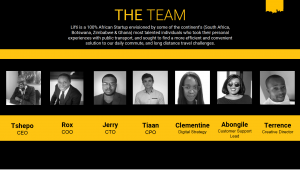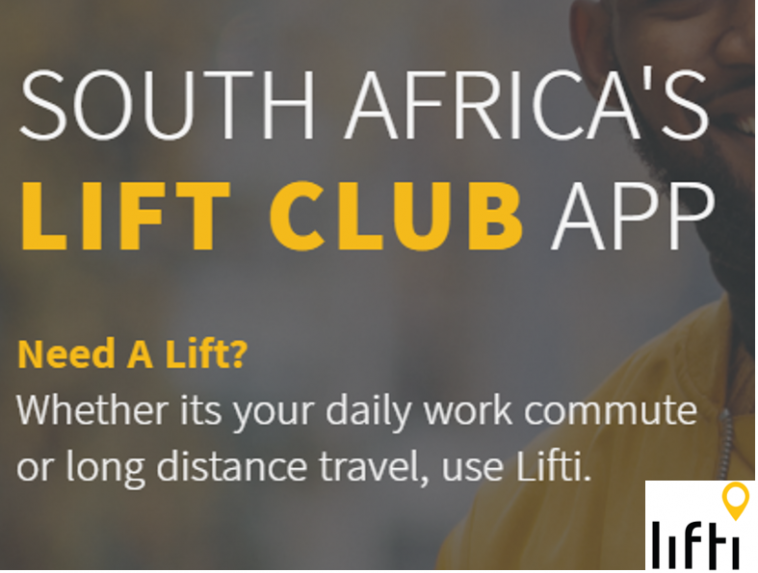TechInAfrica – Meet Tshepo Seeletso , the Lifti founder – Lifti is a lift-club app that matches car owners and passengers from the same neighborhoods, traveling in the same directions, at the same times, to work and back.

First of all, can you pitch us your company in just a few sentences?
Lifti is a lift-club app that matches car owners with passengers from the same neighbourhoods, short or long distances comfortably and reliably, while our drivers are afforded the opportunity to share their fuel costs with passengers by offering their empty seats. Lifti makes one’s daily work commute or long distance travel seamless and far more predictable than it would be using public transport. Lifti is not a cab service, but a lift club. While cab services generally charge approximately R7.50 per km, we charge between 55 cents and R2.00 per km.An added benefit of using the Lifti app to secure lifts, is that our passengers are able to select from a variety of ride preferences, everything from how much luggage they can bring on the trip, to whether or not music will be played, whether or not food may be consumed in the car, and so much more.
Can you tell us more about yourself, your personal background, your experience and how you went to this journey?
I’m a serial entrepreneur with vast experience in the South African media industry, spanning across 14 years. I’ve built a diverse career, working on a variety of projects ranging from advertising, music, television and events.
I’ve worked with reputable brands such as Mnet, Channel O, TopTv, SABMiller and Nedbank, to name a few. He’s also worked with highly acclaimed artists such as Neyo (USA), John Legend (USA), Chris Brown (USA), Freshlyground (SA), Rebecca Malope (SA), Khuli Chana (SA), AKA (SA) and many more.
I’m currently the CEO and Co-Founder of Lifti – South Africa’s lift club app. Lifti is a new kid on the block as far as carpooling apps go, and it promises to be the answer to many a commuter’s woes, qualms and frustrations. Prior to starting Lifti, he was the Founder and Director of an Advertising Agency which serviced clients such as Shell, Orange Mobile and Tongaat Hulett. The 18 months leading up to the formation of Lifti were a particularly challenging period in my life. After a very emotional roller coaster, I shut down my advertising company and decided to start over again. I was highly dissatisfied with the traditional kind of business, it no longer stimulated me nor my imagination and I had slowly started taking great interest in the entire tech world or rather the startup scene. Yes, I was making bucket loads of money in advertising but although I excelled at it, I didn’t feel it was my calling and it did nothing to fulfill my purpose. My growing interest in tech was further ignited by the idea of what this could all mean for Africa.
I saw great opportunity to be the custodian of my own ideas and possibly solve the intrinsic problems we face as Africans. Truth be told, I knew nothing much about startups or tech. In the months that followed, I stopped all business activities in an effort to overcome what was a slow build up to heavy depression. Through an unfortunate sequence of events, I lost everything; my home, cars, friends, family and everything in between, I had no strength to even imagine anything else. Despite all of this, my fascination with tech and startups continued to grow so I spent all my downtime reading books, articles, watching documentaries and YouTube videos about startups.I was obsessed and still am.
For the first time in my life I began to understand how the things we use in our daily lives were built and how the founders had gone on these epic journeys to see them through. My imagination ran wild, I spent several hours a day soaking up any and all the information I could find, going as far as trying to teach myself how to code. Despite my good intentions, none of this had any practical application in my life, I just didn’t have the strength to try and start a company, I even began looking for a job to sustain me financially. What I did manage to do during this period though, was map out a lot of ideas, many of which are completed 100+ page pitch decks which I still have today. What I didn’t know then, was that I was putting myself through a “Startup MBA” program as I like to call it. I was practically in school. I woke up daily and studied all sorts of material about successful and failed startups. One particular YouTube series to note is the Harvard Innovation Labs or Harvard i-Labs: Startup Secrets.
Everything I had been learning was now being practically taught to me in a classroom type setting. The lectures held by Michael Skok – a man I wish to one day meet in person, were golden to me. Because of him I can say I’ve attended Harvard Business school. I watched hours and hours of this stuff, repeating them at least 3 to 5 times each. Skok took the theoretical concepts I had randomly been learning and turned them into a workable syllabus. What really stood out was how this self-education saved me from plunging into deeper depression. Every morning I woke up and basically went to school, distracting my mind from anything else and it proved to be priceless a few months later.
I then started exploring the Startup scene in South Africa and Africa at large. I even went as far as writing a thesis on Video On Demand services, which exposed me to the likes of iRoko in Nigeria. I eventually ended up spending a good three months in Cape Town, which is better known as the Silicon Cape due its bustling tech startup scene. In Johannesburg I visited the likes of Tshimologong Innovation Precinct at Wits University and also met with the founders of a startup called Kalido in Forest Town. I had no clear idea of what I was searching for, but I was captivated and knew somehow I would find what I wanted to do. The whole journey kept me occupied for months until I decided that I wanted to get experience by working for a startup. During one of my visits to Cape Town, I visited the Woodstock Exchange and found a few operational startups in the building.
I psyched myself up one morning and walked into one of the incubators and asked if I could meet the CEO (the staff found it pretty bizarre – I couldn’t care less though) and explained that I wanted to experience the startup scene. I waited for hours for management to give me a bit of time which they eventually did. I subsequently came back a few days later for an interview which I aced and got accepted. I wasn’t going to get paid initially because they were busy raising funds, but I didn’t care, I was just happy to finally be a part of this exciting space. I wasn’t particularly excited about the project I was made a part of, but I developed my enthusiasm by doing vast amounts of research about the industry. What I learnt through this journey of hardship and personal discovery turned out to be priceless down the line.
I’m pretty sure none of what has happened to date would have happened had I taken a different path which kept me in the advertising space. As awful as some of my experiences were, they took me on a journey of exploration and growth I could never have imagined. It was awful tasting medicine but the patient needed it. All throughout my struggles with depression and bankruptcy I hung onto the dream of one day founding a startup that would have massive scale potential and social impact across the continent. I had no foreseeable way of doing this, broke, in debt and crashing at a friend’s house, but something in me kept me going. A lot of these random occurrences seemed unrelated at the time but looking back now, I’ve probably married every one of them to start Lifti.
Can you tell us more about South Africa ? Why this market ?
I love this country, despite its past, the people are resilient and it’s beautiful. They’re thriving cities, majestic towns, a desert, beaches and safaris, one of the only countries in the world with a bit of everything. As people we generally like to complain and I often tell them to visit other African countries to see how fortunate SA is, it’s an anomaly to be honest. The infrastructure is ripe enough to support innovation and ambition is celebrated. The diversity means you can be who and what you want to be, poets, bankers, academics…you name it.
We chose SA by default because we live here but most importantly the public transport infrastructure is fragmented and price of fuel is high so it made sense. We’re solving a real life problem without asking for people to look for more money for our service. Lift clubs are not a new concept, we’ve been doing them forever, we’re simple making it more efficient and safer. SA also has a great pool of talent.
Who are your main competitors around ? And outside of the country, who are your inspiration ?
We don’t speak of our competitors, there are a few and we welcome them, as long they are Africans, we’re happy. Internationally there’s Blablacar and although we don’t look to them for inspiration, we envisage ourselves competing with them one day and we’re confident we have what it takes to achieve this. We’ll make a lot of mistakes on the way but our attitude is to learn and be resilient. Some of our inspiration outside of the country include Zappos for customer service, Google for business model, AirBnB for corporate culture, Uber for tenacity and Xerox Parc, (in the 1970s and 80s) for innovation.
Is it hard to find investors there ?
Its near impossible. Local investors dont back ideas, they will only put their money down when there’s a profit being made, which makes no sense to me because at that point we don’t need investment. It’s sad to see but its the international community that’s more responsive. One would think friends and family would be the first to invest but they’re the biggest skeptics, polar opposites to Jews, Indians and Asians, they invest in each other heavily, sad but true. We were fortunate to find funding from old business associates who knew our work ethic and believed in us but it was 2 yes’s out of 200 no’s.
What do you think is lacking to South Africa to develop it more? What are the main barriers to develop a startup there?
Corporates are a big barrier to entry. They don’t understand the startup ecosystem and are not even willing to try. We rely on them for many services as startups but they shut the door without even listening. These are gate keepers and if they continue to dismiss us they will soon be the ones to be disrupted. Government too presents startups with barriers. The laws are outdated and changing them is near impossible when it’s clear they don’t serve the purpose of making life better for citizens. Investors are also a big barrier.
They fail to look at the team and its resolve, they skim through pitch decks then give some halfhearted feedback about why it won’t work. It’s almost as if they don’t educate themselves about the startup ecosystem in the African context, this is Africa not Silicon Valley, we play to a different set of rules. Black investors are also nonexistent, supporting youth in business to pay it forward is what’s needed in Africa, not just SA.
What is your perspective for the next years on South Africa and more regionally on Africa?
I’m a proud African patriot, when most look out to foreign nations for admiration I look at the untapped potential of our beautiful continent. It’s important to note that where there are many problems to be solved there’s great opportunity and Africa is truly the last frontier. I would be lying if I said I was always so optimistic. Growing up we were always taught to idolise continents like North America and Europe through school curriculums and the media at large. The painted picture of Africa was always a grim one filled with poverty, illness, wars and bad leadership but the narrative is surely changing and many are passive towards it. I recently discovered a YouTube series sponsored by FNB South Africa called “The leadership Journey” that chronicles the lives of SA’s biggest business leaders and I’m captivated. I often ask those around me to point out African heroes besides the obvious ones like Nelson Mandela,
Steve Biko etc, but after discovering this series I attest to my ignorance. They’re plenty and I’m moved by these men and women’s stories of struggles and victories. We’ve been misled to generally idiolise “false prophets” based on pure wealth and bravado with no real substance, but people like Rre Bonang Mohale need to be brought to the fore because this is the kind of thinking that’s contagious and needs to be spread. They represent the generation before ours and have continued the narrative of their forefathers but we seem to have lost perspective amongst the big global transformation taking place.
I’m referred to as the millennium generation and to be honest there are only a handful of peers that hold the same conviction as I do about creating pan African change. We’ve become so westernised and bluntly put, ignorant about what roles we’ve been called upon to play. We have no real sense of purpose in the context of Africa and I find that really sad because our forefathers sacrificed and fought so we can be educated enough to be change agents. Instead we find entertainment in frivolous Twitter feeds aimed at tearing each other down and mocking those that try. Granted, we are all different and aren’t all called on to save the world, but there must be something entrenched in all of us to somewhat contribute, even in the slightest.
I recently watched a television interview with Sizwe Mpofu-Walsh and oh man was I touched by such intelligence and a deep sense of purpose. Another to speak of is Vusi Thembekwayo, such a distinguished example of our forefather’s efforts to bring us to a point of enlightenment. I personally now idolise the likes of Vusi and Sizwe over the Mark Zuckerburg’s and Steve Jobs’ of the world because they’re relevant to my everyday realities and contexts.
These are now my heroes and when I reference the likes of Rre Mohale I’m confronted with the warp sense of reality we now live by as African youth. We measure each other on the foreign brands we buy instead of principles and substance. In conclusion we need to change the narrative so we can shape the world we live in and are affected by. Find your place in the re-writing of this continent’s narrative, however big or small. We must examine our states of insular bravado and lack of substance to get to a sobering moment of actualisation.
We must get to a point of singularity in purpose as African youth irrespective of which country you come from. We must get to a place where we individually ask ourselves irrespective of creed and colour what we are doing to create a better future for ourselves. If you’re going to be passive then don’t complain. For those that are playing a meaningful role, we need you to move out of the shadows and lead us because in a world filled with so much white noise we need a sound doctrine to infect us.
As you know, we are always on the look of the great startups, new products and amazing entrepreneurs, could you name a few locally or regionally in South Africa ?
The first one that comes to mind is Pineapple insurance, I don’t know why but I really like what those guys are doing. I really like Vusi Thembekwayo’s thinking, im however still to see the businesses he’s backed but he has the right narrative for Africa. One of my favourite entrepreneurs has to be Gil Oved, he’s a great inspiration. I’m all about African’s who build their own products, being the middle man doesn’t cut it anymore and success measured in money is warped, it’s about impact and purpose.

For the further information go visit https://www.lifti.com/; and send an email to [email protected]



